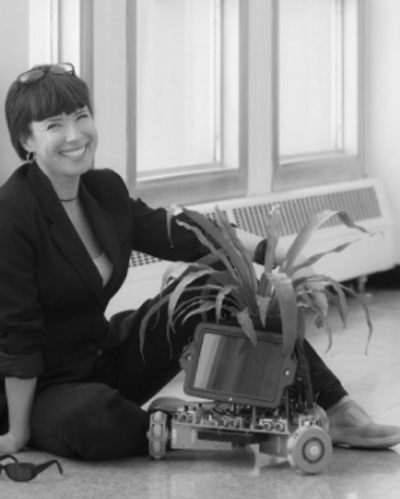
Elizabeth Demaray is a Brooklyn based sculptor, whose area of inquiry is the interface between the built and the natural environment. In this vein, Demaray makes listening stations for birds that play human music, fabricates alternative forms of housing for hermit crabs from artificial materials, and builds light-sensing robotic supports for houseplants. This last endeavor, titled IndaPlant Project: An Act of Trans-Species Giving, entails creating moving floraborgs that utilize machine learning to allow potted plants to roam freely in a domestic environment in search of sunlight and water (https://vimeo.com/90457796).
Writing about her work, Richard Klein, Exhibition Director at the Aldrich Museum states
“Demaray provokes complex questions concerning memory, knowledge, and the collaborative cognitive process that exists between artist and viewer … while making a body of work that has consistently confounded expectations by creating connections between diverse and often contradictory bodies of knowledge.”
Demaray holds a BA in cognitive psychology and an MFA in studio practice from UC Berkeley and is an alumni of the Skowhegan School of Painting and Sculpture. She is the recipient of the National Studio Award from the New York Museum of Modern Art/P.S.1 Contemporary Art Center, the New York Foundation for the Arts Fellowship in Sculpture, the California Artist in Residency Award at the Headlands Center for the Arts, the Art Omi Residency Award and the Aldrich Museum of Contemporary Art Emerging Artist Award. In 2014 she received the featured artist award at the Association of Environmental Science Studies Symposium titled “Welcome to The Anthropocene.”
Demaray is an Associate Professor of Fine Arts and head of the sculpture concentration at Rutgers University, Camden. On the Rutgers, New Brunswick, campus, she is a workgroup advisor in the Department of Aerospace and Mechanical Engineering and a co-founder of the DigiHuman Laboratory in the Department of Computer Science, now titled the Art and Artificial Intelligence Lab, which is dedicated to supporting artistic practice in the fields of computer vision and machine learning.
